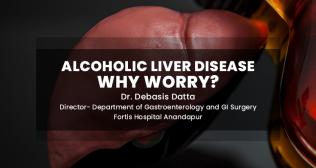
Gastroenterology and Hepatobiliary Sciences
Digestive Disorders And Prevention
Dr. Ajay Bhalla May 21, 2014

Friedrich Nietzsche, a German philosopher, said “The abdomen is the reason why man does not readily take himself to be a God”. When it comes to the human body, one of the most sensitive components is the digestive system. It's easily upset by disease, emotional factors and even malfunctions in other parts of the body. Most of us experience symptoms of acidity, bloatedness, belching and flatulence or pain in abdomen. Have you ever thought about its cause? There's something about digestive difficulties that makes them hard to discuss in polite company—which leaves many of us suffering in silence. What's more, digestive disorders are causing an unprecedented number of clinic visits and hospitalizations.
Gastroenterology is a branch of medicine focused on diagnosing and treating diseases of digestive system. This constitutes diseases involving the gastrointestinal tract, namely the esophagus, stomach, small intestine, large intestine and rectum, and the accessory organs of digestions, the liver, gallbladder and pancreas.
Here are three of the most common disorders that can threaten your digestive health:
•
GERD (Gastro Esophageal Reflux disase):
Heartburn (hot or burning feeling rising up from the center of the abdomen area and into the chest under the breastbone or sternum) and Regurgitation (finding food or fluid in your mouth) associated with a sour taste in the mouth, or hyper salivation (water brash) are the main symptoms. Diagnosis requires confirmation with an UGI Endoscopy and treatment involves lifestyle modification (not to lie down for 90 minutes after meals), dietary modification (avoid fatty food and aerated drinks) and drugs (antacids). Patients not responding to medicines can be subjected to Endoscopic or Laparoscopic management.
•
PEPTIC ULCER DISEASE: Burning pain upper abdomen and hunger pangs are commonly ignored as simple acidity but are hallmarks of an ulcer formation in the stomach or upper small intestine (Duodenum). Around 80 per cent of ulcers are attributed to a bacterial infection (H.pylori) and this can be diagnosed by UGI Endoscopy. Treatment options include drugs that reduce acid levels, such as the proton pump inhibitors (Rabeprazole, Omeprazole, Pantoprazole) and the H2 blockers (Ranitidine, Famotidine) and 7-10 days of antibiotic therapy for H. Pylori left untreated, ulcers can cause internal bleeding and perforation requiring therapeutic endoscopy or surgery.
• GASTROENTERITIS is an infection of the gut. It causes diarrhoea and may also cause vomiting, abdominal pain and other symptoms. The severity can range from a mild tummy upset for a day or two with some mild diarrhoea, to severe diarrhoea and vomiting for several days or longer. Many viruses (Rotavirus, Adenovirus), bacteria (Salmonella, E.coli) and other microbes (parasites) can cause gastroenteritis. The main treatment is to have lots to drink which aims to avoid dehydration. Seek medical advice if you suspect that you are becoming dehydrated (you are vomiting a lot and unable to keep fluids down) or you have blood in your stools or vomit or you have severe abdominal pain or persisting high fever. Treatment involves I/V fluids, antibiotics, antiemetics and symptoms settle in few days.
The best way to minimize these three disorders by threatening your digestive health is to learn their major symptoms and promptly report these to your doctor.

 Friedrich Nietzsche, a German philosopher, said “The abdomen is the reason why man does not readily take himself to be a God”. When it comes to the human body, one of the most sensitive components is the digestive system. It's easily upset by disease, emotional factors and even malfunctions in other parts of the body. Most of us experience symptoms of acidity, bloatedness, belching and flatulence or pain in abdomen. Have you ever thought about its cause? There's something about digestive difficulties that makes them hard to discuss in polite company—which leaves many of us suffering in silence. What's more, digestive disorders are causing an unprecedented number of clinic visits and hospitalizations.
Friedrich Nietzsche, a German philosopher, said “The abdomen is the reason why man does not readily take himself to be a God”. When it comes to the human body, one of the most sensitive components is the digestive system. It's easily upset by disease, emotional factors and even malfunctions in other parts of the body. Most of us experience symptoms of acidity, bloatedness, belching and flatulence or pain in abdomen. Have you ever thought about its cause? There's something about digestive difficulties that makes them hard to discuss in polite company—which leaves many of us suffering in silence. What's more, digestive disorders are causing an unprecedented number of clinic visits and hospitalizations.
28 Years
1600















